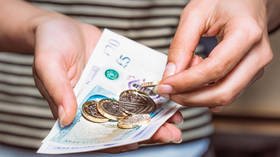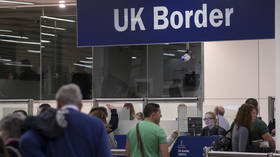Big Brother benefits: Covid accelerates transition to cashless society – but does it mean more safety or less freedom for us?

Never let a good crisis go to waste, the old saying goes, and we can see that clearly with ‘Covid-19 health concerns’ being used as an excuse to stop people exercising their right to pay in cash.
The drive towards a cashless society was well under way even before we’d ever heard the words ‘Covid-19’ but it’s been greatly accelerated in Britain these last few weeks. Either businesses have stopped people paying in cash, or they’ve said that if anyone still wants to use cash and coins, no change will be given if it’s not the right amount.
In April, it was announced that passengers on Go North East buses would have to have the exact amount to pay for their fare, or else they would have to pay by card. The managing director of the company said: “This is the latest change we’ve made to improve safety for both our workforce and our customers.”
From 14 May we won’t be issuing change if you pay with cash on our buses in the South East, to help protect you & our colleagues. If you need to use cash and you give us more than the exact fare, we’ll donate any over-payment to @DemelzaHospiceMore info> https://t.co/TI7FaFfL5gpic.twitter.com/8wLRxeZKoT
— Stagecoach South East (@StagecoachSE) May 10, 2020
Other bus operators, including Stagecoach South East (see the tweet above), have followed suit, which begs the question: Just how dangerous to the safety of the workforce and customers is handling cash?
It’s been reported that 29 bus drivers have died with Covid-19 in London, but the capital’s buses have been cash-free since 2014.
“The amount of virus that is potentially on an inanimate object is usually very small,” Dr Christine Tait-Burkard, an expert on infection and immunity, told the Guardian in March. She continued: “Coins are actually very bad environments for viruses to survive.” Banknotes theoretically COULD carry the virus, but the risk of getting it from one is very small. “Unless someone is using a bank note to sneeze in,” was Tait-Burkard’s assessment.
Yet despite the risks of infection being extremely low, Covid-19 scare tactics are being used to try and get us to change our payment habits.
Ross Clark, the author of ‘The War Against Cash,’ has revealed that back in January his email inbox began to fill up with press releases claiming the new contagion was being spread by banknotes and coins and that these emails came – surprise, surprise – from companies with a vested interest in cashless payments. He noted that in 2015 alone, $19 billion had been invested in the FinTech industry, and that by 2023, the industry is expecting to double the $1 trillion it currently takes in fees for handling electronic payments.
On April 1, the UK government duly increased the limit on payments by contactless cards from £30 ($36.56) to £45 ($54.84).
The authorities see a ‘cashless society’ as a key component of the ‘new normal’ they want to impose on us when lockdown is finally ended. Look at the plans that have been revealed on how pubs will operate when they are allowed to re-open. They involve customers paying for drinks via a smartphone app at their ‘socially-distanced’ tables.
Also on rt.com Startup creates money-disinfecting cash machine that 'KILLS coronavirus'When will the days of waving a £10 note to pay at the bar come back? Well, they won’t unless we take a stand. There are a number of important reasons why we must fight tooth-and-claw to keep the cash option.
For a start, the move to eliminate cash from everyday transactions is inherently ageist and discriminates against those who don’t use smartphones or have a bank account. Senior citizens are much less likely to have, or know how to use, smartphones, or indeed possess credit cards. How will someone who doesn’t have a phone buy a drink in the ‘new normal’ – but actually very abnormal – post-lockdown ‘socially-distanced’ dystopia that the likes of Priti Patel have in store for us?
Then there’s the fact that in a cashless society all our transactions would be recorded. Do we really want this, given the way the executive is already using the cover of Covid to remove long-standing civil liberties?
Suppose a cashless society is achieved. Everyone is on Universal Basic Income (UBI), everyone makes payments by card or via an app, or through a skin-implanted microchip. We have the perfect conditions for a totalitarian system, which would potentially be far more controlling than any in human history.
Step out of line and you’d run the risk of being frozen out of the financial system totally. You’d receive the message: “We regret to inform you that your card payment has been refused. You expressed ‘hate crime’ views and ‘dangerous’ opinions on social media last month which means your UBI is suspended for two months and you cannot use your card until further notice.” Imagine how freezing people out of receiving and making payments could be used to enforce conformity and compliance. The Chinese social credit systems, where people can earn points or lose them for ‘good’ or ‘bad’ behavior, provides a template.
While a cashless society is Big Brother’s ultimate wet dream, cash is the tyrant’s worst enemy.
It provides the citizen with the ability to maintain their independence from overweening authority. No one can ‘cut you off.’ A wad of bank notes gives you the freedom to buy what you want without any Big Tech company or government snoop knowing. The fight for the right to pay in cash is going to be a crucial one in the battle against the new hi-tech behavioral-control model which is being rolled out in front of our very eyes. It’s a war that must be won, otherwise we need to get used to a terrible new servitude. In the end we need cash, because the price we’ll pay in a society without it will be far too high.
Like this story? Share it with a friend!
The statements, views and opinions expressed in this column are solely those of the author and do not necessarily represent those of RT.















